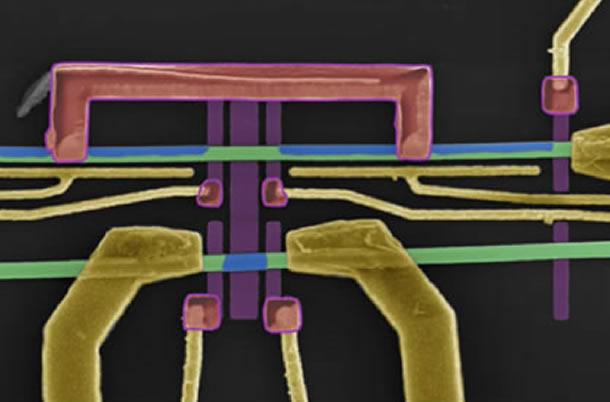Today is the third and last post based loosely on upcoming techie stuff I learned about at the recent Microsoft Future Decoded conference here in London. It’s another speculative one this time, focusing on quantum computing, which according to estimates by speakers might be about five years away. But a lot has to happen if that five year figure is at all accurate.

It’s a very technical area, both as regards the underlying maths and the physical implementation, and I don’t intend going far into that. Many groups around the world, both in industry and academia, are actively working on this, hoping to crack both theory and practice. So what’s the deal? Why all the effort?
Conventional computers, of the kind we are familiar with, operate essentially in a linear sequential way. Now, there are ways to fudge this and give a semblance of parallel working. Even on a domestic machine you can run lots of programs at the same time, but at the level of a single computing core you are still performing one thing at a time, and some clever scheduling shares resources between several in-progress tasks. A bigger computer will wire up multiple processors and have vastly more elaborate scheduling, to make the most efficient use of what it’s got. But at the end of the day, present-day logic circuits do one thing at a time.
This puts some tasks out of reach. For example, the security layer that protects your online banking transactions (and such like) relies on a complex mathematical problem, which takes an extremely long time to solve. In theory it could be done, but in practice it is impenetrable. Perhaps more interestingly, there are problems in all the sciences which are intractable not only with present-day systems, but also including any credible speed advances using present-day architecture. It actually doesn’t take much complexity to render the task impossible.

Quantum computing offers a way to actually achieve parallel processing on a massive scale. It relies not on binary true/false logic, but on the probability models which are the foundation of the quantum world. It is as though many different variations of a problem all run simultaneously, each (as it were) in their own little world. It’s a perfect solution for all kinds of problems where you would like to find an optimal solution to a complex situation. So to break our online security systems, a quantum computer would simultaneously pursue many different cracking routes to break in. By doing that, the task becomes solvable. And yes, that is going to need a rethink of how we do internet security. But for today let’s look at a couple of more interesting problems.

First, there’s one from farming, or biochemistry if you prefer. To feed the world, we need lots of nitrogen to make fertiliser. The chemical process to do this commercially is energy-intensive, and nearly 2% of the world’s power goes on this one thing. But… there is a family of plants, the leguminosae, which fix nitrogen from the air into the soil using nothing more than sunlight and the organic molecules in their roots. They are very varied, from peas and beans down to fodder crops like clover, and up to quite sizeable trees. We don’t yet know exactly how this nitrogen fixing works. We think we know the key biochemical involved, but it’s complicated… too complicated for our best supercomputers to analyse. A quantum computer might solve the problem in short order.
Climate science is another case. There are several computer programs which aim to model what is going on globally. They are fearfully complicated, aiming to include as wide a range as possible of contributing factors, together with their mutual interaction. Once again, the problem is too complicated to solve in a realistic time. So, naturally, each group working on this makes what they regard as appropriate simplifications and approximations. A quantum computer would certainly allow for more factors to be integrated, and would also allow more exploration of the consequences of one action rather than another. We could experiment with what-if models, and find effective ways to deploy limited resources.

So that’s a little of what might be achieved with a quantum computer. To finish this blog post off, what impact might one have in science fiction, and my own writing in particular. Well, unlike the previous two weeks, my answer here would be “not very much, I think“. Most writers, including myself, simply assume that future computers will be more powerful, more capable, than those of today. The exact technical architecture is of less literary importance! Right now it looks as if a quantum computer will only work at extremely low temperatures, not far above absolute zero. So you are talking about sizeable, static installations. If we manage to find or make the necessary materials that they could run at room temperature, that could change, but that’s way more than five years away.

So in my stories, Slate would not be a quantum computer, just a regular one running some very sophisticated software. Now, the main information hub down in London, Khufu, could possibly be such a thing – certainly he’s a better candidate, sitting statically in one place, processing and analysing vast quantities of data, making connections between facts that aren’t at all obvious on the surface. But as regards the story, it hardly matters whether he is one or the other.
So, interested as I am in the development of a quantum computer, I don’t think it will feature in an important way in the world of Far from the Spaceports!
That’s it for today, and indeed for this little series… until next year.
